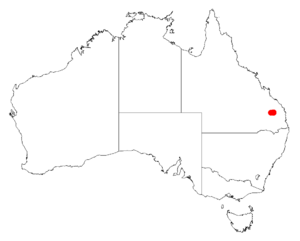Acacia eremophiloides facts for kids
Quick facts for kids Acacia eremophiloides |
|
|---|---|
| Conservation status | |
| Scientific classification |
|
| Kingdom: | Plantae |
| Clade: | Tracheophytes |
| Clade: | Angiosperms |
| Clade: | Eudicots |
| Clade: | Rosids |
| Order: | Fabales |
| Family: | Fabaceae |
| Clade: | Mimosoideae |
| Genus: | Acacia |
| Species: |
A. eremophiloides
|
| Binomial name | |
| Acacia eremophiloides Pedley & P.I.Forst.
|
|
 |
|
| Occurrence data from AVH | |
| Script error: The function "autoWithCaption" does not exist. | |
Script error: No such module "Check for conflicting parameters".
Acacia eremophiloides is a type of shrub that belongs to the group of plants called Acacias. It is special because it grows naturally only in Queensland, Australia. This means it is an endemic species to that area.
Contents
What Does This Wattle Look Like?
This shrub is often sticky because it has resin on it. It also has smooth, hairless parts. It can grow up to about 2.5 meters (about 8 feet) tall. Its branches are thin.
Leaves and Flowers
The leaves of this plant are quite unique. They are called phyllodes, which are flattened leaf stems that act like leaves. These phyllodes stay green all year round. They usually stick out or stand upright. They are long and narrow, sometimes slightly curved. Each phyllode is about 3 to 6.5 centimeters long and 2.5 to 4 millimeters wide. They get narrower towards the bottom and have a clear middle vein and edges.
The plant produces simple inflorescences, which are groups of flowers. These flower groups grow alone or in pairs where the leaves meet the stem. The flower-heads are round and have 20 to 30 golden-colored flowers.
Seed Pods
After the flowers bloom, long, cinnamon-brown seed pods form. These pods are slightly bumpy over each seed. They can grow up to 8 centimeters long and 3.5 to 5 millimeters wide. Inside the pods, the seeds are arranged lengthwise and are about 3.3 millimeters long.
How Was This Plant Named?
This plant was first officially described by two botanists, Leslie Pedley and P.I.Forst. They wrote about it in 1986. Their work was published in a science journal called Austrobaileya.
Changes to Its Name
In 1987, Pedley changed its name to Racosperma eremophiloides. However, in 2001, it was moved back to the Acacia genus. This shows how scientists sometimes change plant names as they learn more.
Where Does This Wattle Grow?
This special Acacia is found only in a small part of South East Queensland. It lives in an area known as the Burnett pastoral district.
Specific Location and Size
The main group of these plants is about 45 kilometers southwest of Gayndah. It is also about the same distance southeast from Mundubbera. The area where this plant grows is quite small, only about 10 kilometers wide.
There are about 5,000 plants in this group. They live in an area of about 4 to 5 hectares. You can find them growing on and around granite rocks. They grow at an altitude of about 460 to 550 meters above sea level.
 | Delilah Pierce |
 | Gordon Parks |
 | Augusta Savage |
 | Charles Ethan Porter |


